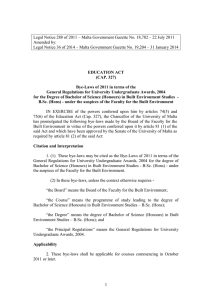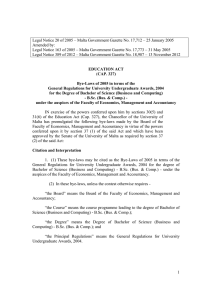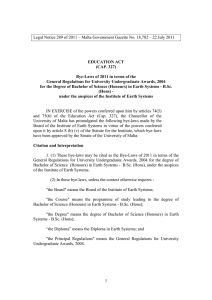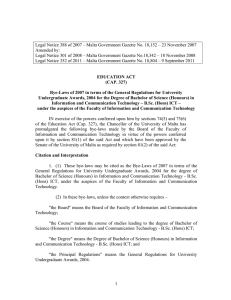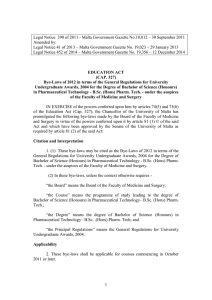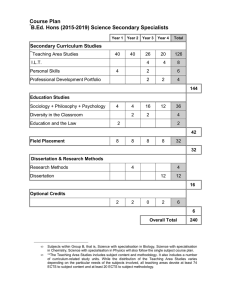Legal Notice 187 of 2005 – Malta Government Gazette No.... Amended by:
advertisement
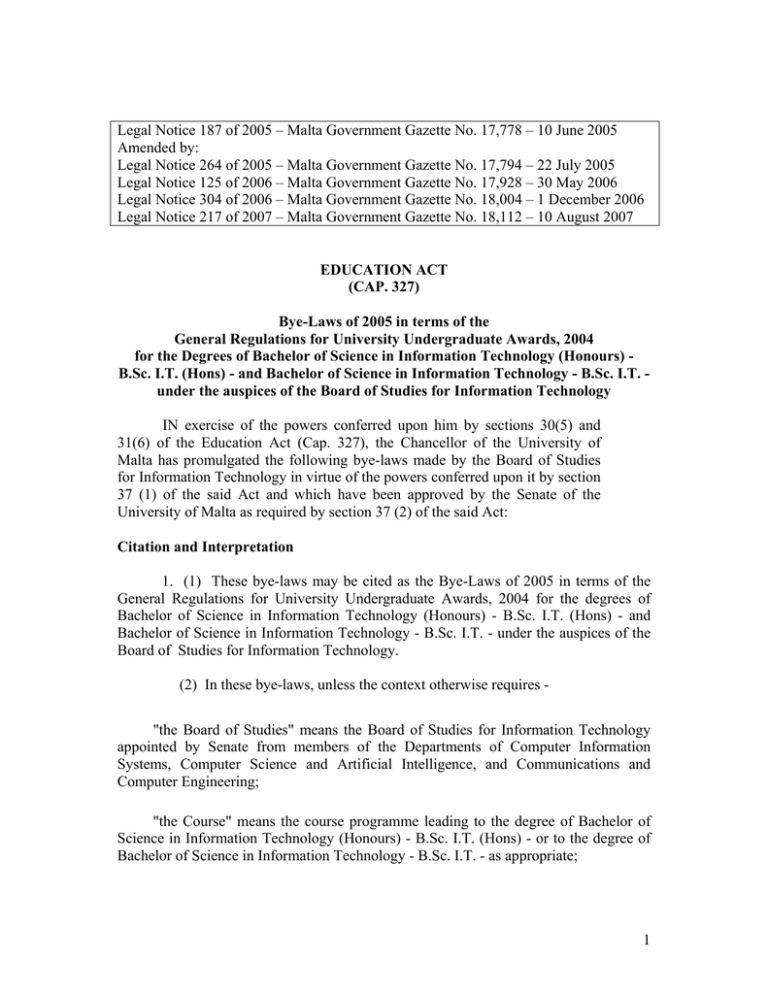
Legal Notice 187 of 2005 – Malta Government Gazette No. 17,778 – 10 June 2005 Amended by: Legal Notice 264 of 2005 – Malta Government Gazette No. 17,794 – 22 July 2005 Legal Notice 125 of 2006 – Malta Government Gazette No. 17,928 – 30 May 2006 Legal Notice 304 of 2006 – Malta Government Gazette No. 18,004 – 1 December 2006 Legal Notice 217 of 2007 – Malta Government Gazette No. 18,112 – 10 August 2007 EDUCATION ACT (CAP. 327) Bye-Laws of 2005 in terms of the General Regulations for University Undergraduate Awards, 2004 for the Degrees of Bachelor of Science in Information Technology (Honours) B.Sc. I.T. (Hons) - and Bachelor of Science in Information Technology - B.Sc. I.T. under the auspices of the Board of Studies for Information Technology IN exercise of the powers conferred upon him by sections 30(5) and 31(6) of the Education Act (Cap. 327), the Chancellor of the University of Malta has promulgated the following bye-laws made by the Board of Studies for Information Technology in virtue of the powers conferred upon it by section 37 (1) of the said Act and which have been approved by the Senate of the University of Malta as required by section 37 (2) of the said Act: Citation and Interpretation 1. (1) These bye-laws may be cited as the Bye-Laws of 2005 in terms of the General Regulations for University Undergraduate Awards, 2004 for the degrees of Bachelor of Science in Information Technology (Honours) - B.Sc. I.T. (Hons) - and Bachelor of Science in Information Technology - B.Sc. I.T. - under the auspices of the Board of Studies for Information Technology. (2) In these bye-laws, unless the context otherwise requires "the Board of Studies" means the Board of Studies for Information Technology appointed by Senate from members of the Departments of Computer Information Systems, Computer Science and Artificial Intelligence, and Communications and Computer Engineering; "the Course" means the course programme leading to the degree of Bachelor of Science in Information Technology (Honours) - B.Sc. I.T. (Hons) - or to the degree of Bachelor of Science in Information Technology - B.Sc. I.T. - as appropriate; 1 “the Degree” means the degree of Bachelor of Science in Information Technology (Honours) - B.Sc. I.T. (Hons) - or the degree of Bachelor of Science in Information Technology - B.Sc. I.T. - as appropriate; “the Honours Degree” means the degree of Bachelor of Science in Information Technology (Honours) - B.Sc. I.T. (Hons); “the Ordinary Degree” means the degree of Bachelor of Science in Information Technology - B.Sc. I.T.; and "the Principal Regulations" means the General Regulations for University Undergraduate Awards, 2004. Applicability 2. These bye-laws shall be applicable to courses commencing in October 2003 or later. Areas of Study 3. The Degree shall be awarded in one of the following areas of specialisation: (a) (b) (c) Informatics; Computer Science; and Computer Systems Engineering. Special Course Requirements for Admission 4. (1) To be registered as regular students in the Course, applicants shall, apart from satisfying the general requirements for admission as specified in the Admission Regulations, be in possession of: (a) passes at Advanced Matriculation Level at Grade C or better in Pure Mathematics and in one of the following subjects: Applied Mathematics, Biology, Chemistry, Computing, Economics, English, Information Technology, Music, Philosophy, and Physics; and passes at Intermediate Matriculation Level in Computing or Information Technology, and Physics if not offered at Advanced Matriculation Level; or 2 (b) (i) five passes in the Secondary Education Certificate Examination including English Language, and Maltese; and (ii) a pass in Systems of Knowledge at Intermediate Matriculation Level; and (iii) a pass at Advanced Matriculation Level at Grade C or better in Pure Mathematics or at a corresponding level of other examinations recognised by Senate for the purpose of the Admission Regulations; and (iv) either (a) a Higher Technician Diploma of the City and Guilds of London Institute Course No. 8000 in Electrical Engineering; or (b) the Diploma in Industrial Electronics, with Credit, of the Fellenberg Training Centre; or (c) the Advanced Diploma of the City and Guilds of London Institute Course No. 7235 in Applied Information Technology; or (d) MCAST-BTEC Higher National Diploma (HND) in Computing; or (e) any other qualification from a recognised institution considered by the Board of Studies to be equivalent to any of (a), (b), (c) or (d); or (c) the MCAST-BTEC Higher National Diploma in Computing with distinction may be admitted into the second year of the Course, under those conditions as the Board of Studies may impose, provided they have a pass at Advanced Matriculation Level at Grade C or better in Pure Mathematics. (2) As from October 2005, students who lack a grade in only one of the subjects of the special course requirements required at Advanced Matriculation Level indicated in paragraph (1) of this bye-law shall be admitted under those conditions as the Board of Studies may impose to compensate for the missing element. If, by the end of the first year, such students do not successfully complete all the requirements to progress regularly to the second year of the Course, they shall be required to withdraw from the Course and shall neither be entitled to repeat the year nor to progress conditionally as normally permitted under the Principal Regulations. 3 Course Duration 5. The Course shall extend over a period of four years of full-time study. Course Programme 6. (1) The Course shall consist of two parts: Part One, comprising the first three years at the end of which the Ordinary Degree may be awarded, and Part Two, comprising the fourth year at the end of which the Honours Degree may be awarded. (2) The first two years of the Course shall be common to all students and shall comprise study-units in Informatics, Computer Science, and Computer and Telecommunication Systems Engineering and in other complementary subjects. (3) At the end of the second year of the Course, students shall be required to choose an area of specialisation from Informatics, Computer Science, and Computer and Telecommunication Systems Engineering on which they will be required to concentrate studies during the rest of the Course. (4) At the end of Part One of the Course, students whose average mark calculated in accordance with the criteria specified in paragraph (2) of bye-law 10 would entitle them to the Ordinary Degree with Category IIB or better shall be allowed to proceed to Part Two of the Course unless they opt to stop and be awarded the Ordinary Degree. (5) Students who successfully complete Part One of the Course but whose average mark over the three years entitles them to the Ordinary Degree with Category III shall not be eligible to proceed to Part Two but shall be awarded the Ordinary Degree. (6) Students who proceed to Part Two of the Course but who do not complete it successfully shall be entitled to the award of the Ordinary Degree. (7) The course programme shall consist of study-units to which 240 credits are assigned as follows: (a) in the first year, 60 credits from the three different areas of specialisation; (b) in the second year, 12 credits in each area of specialisation; 12 credits from any area of specialisation; and 12 credits as directed by the Board of Studies; 4 (c) in the third year, 30 credits for Assigned Practical Tasks; and 30 credits, of which not less than 16 and not more than 20 credits are to be taken in the chosen area of specialisation; and (d) in the fourth year, 24 credits for an extensive project in the chosen area of specialisation as approved by the department responsible for the area of specialisation; 28 credits, of which not less than 16 and not more than 24 credits are to be taken in the chosen area of specialisation and 8 other credits as directed by the Board of Studies. 7. The Board of Studies shall publish the programme of study for each area of specialisation drawn up in accordance with the relevant provisions of the Principal Regulations, and approved by Senate before the commencement of each Course. 8. In any year of the Course students may not register for study-units to which more than 60 credits are assigned unless they are required to register for referred studyunits in terms of regulation 54 of the Principal Regulations. 9. Notwithstanding the provisions of regulation 45 of the Principal Regulations, in any year of the Course, students shall not be awarded more than 12 credits for studyunits passed by compensation and if necessary the students shall be required to choose which study-unit/s of the eligible study-units are to be considered as passed by compensation, to a maximum value of 12 credits. Classification of the Awards 10. (1) The Final Weighted Average Mark for the classification of the Ordinary Degree shall be based on the results obtained in Part One of the Course, each year of which shall be weighted as follows: First Year Average Mark Second Year Average Mark Third Year Average Mark 20% 40% 40%. (2) The Final Weighted Average Mark for the classification of the Honours Degree shall be based on the results obtained in the four years of the Course, which shall be weighted as follows: First Year Average Mark Second Year Average Mark Third Year Average Mark Fourth Year Average Mark 20% 20% 30% 30%. 5 11. Students who successfully complete the first year programme of studies and withdraw from the Course will be awarded the Diploma in Information Technology (Dip. I.T.). 6 BScIT-BL-web 10.8.2006; 27.1.2007; 21.8.2007 7
